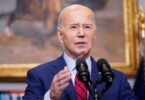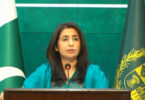WASHINGTON (The Hill): The crisis between Russia and Ukraine is expected to exacerbate what has already been a political headache for the Biden administration: high gasoline prices.
President Biden himself in a speech on Tuesday mentioned energy prices and acknowledged the possibility of “consequences here at home,” saying Americans understand “defending democracy and liberty is never without cost.”
The president on Thursday said the threat of a Russian invasion against Ukraine is “very high,” and Secretary of State Antony Blinken warned at a meeting of the United Nations Security Council that Russia “plans to manufacture a pretext for its attack.”
With Americans focused on their pocketbooks and inflation soaring at a historic rate, further gas price increases could have have political costs for Democrats fighting to retain their majorities in the fall midterm elections.
Uncertainty surrounding oil markets and Russia, the world’s third-largest oil producer, has already driven up prices, which were hovering at around $92 per barrel on Thursday. Experts say those prices could go higher and impact gas prices at the pump.
“I would not be surprised at all if we reach … $100 per barrel in the next few days,” Claudio Galimberti, senior vice president of analysis at energy research firm Rystad Energy, told The Hill on Wednesday.
Galimberti said prices would be pushed up further if Russia actually decides to invade, noting that Ukraine could strike back by sabotaging a key pipeline.
“The geopolitical risk premium will be even higher than it is right now,” he said. He also predicted that this would eventually reach consumers at the pump, saying it’s possible this summer that prices will be “well above” $4 per gallon.
Giovanni Staunovo, a wealth management commodities analyst at UBS, told The Hill the Ukraine crisis comes amid a series of other factors that have disrupted the market.
He noted low global inventories in oil and gas, a drop in investment in new oil and gas projects over the last several years and limited spare capacity in oil and gas.
As a result, “oil and natural gas markets will be very sensitive to any disruption (real or perceived),” Staunovo told The Hill in an email.
Vulnerable Democratic senators have signaled they understand the political ramifications and have begun to press for a suspension of the federal gas tax.
“This is something that directly helps people right now,” Sen. Mark Kelly (D-Ariz.), who is expected to face a tough reelection race this fall, told reporters earlier this week in commenting on the proposed gas tax holiday.
“When I talk to my constituents … it’s the thing I hear most — is rising prices,” he added. “Gasoline’s a big part of it.”
Biden acknowledged in a Tuesday speech that sanctions imposed against Russia if it invades Ukraine are likely to increase gas prices, saying, “I will not pretend this will be painless, there could be impact on our energy prices.”
“If Russia decides to invade, that would also have consequences here at home. But the American people understand that defending democracy and liberty is never without cost,” Biden said.
The Biden administration has sought to get European countries to match a package of punishing U.S. sanctions on Russia as a means to deter Moscow from a new invasion of Ukraine. Russia has maintained control of Ukraine’s Crimean Peninsula since 2014 and has supported separatists in eastern Ukraine for the past eight years.
U.S. and European officials say that they are determined to impose high costs on Moscow if it launches a new attack but have acknowledged the two sides are not completely in alignment on specific sanctions affecting the gas sector.
“Clearly there are concerns in Europe about gas supplies. From what I can gather, the Europeans don’t have the ability to very quickly switch away from Russian gas,” said Edward Fishman, adjunct fellow in the Energy, Economics, and Security Program with the Center for a New American Security, during a panel discussion on Monday.
U.S. dependence on Russian oil exports has made it an unattractive option for sanctions, even though it would be a way to ensure the sanctions were painful for Moscow given the importance of oil to the Russian economy.
“One of the sanctions options that has not been discussed but could potentially hit Russia at its heart is curbing oil and gas, but we know the interdependence that Europe has with the Russian gas market and oil that the U.S. receives from Russia works as a shield from triggering this option,” said Maria Shagina, a visiting fellow at the U.S. Center for Politics and Power at the Finnish Institute of International Affairs.
Sanctions on the Russian natural gas sector would not be expected to increase U.S. natural gas prices.
While oil is a global commodity, natural gas markets tend to be more “regional,” Galimberti, of Rystad Energy, said.
The Biden administration has faced near-constant Republican attacks over high gas prices that averaged around $3.52 cents per barrel on Thursday.
Since the oil market is global, presidents have limited influence over prices, but Republicans argue Biden’s policies are making the country more dependent on foreign producers, such as Russia.
“The United States is one of the greatest producers of energy out there. And yet under the Biden administration, he has made us ever increasingly dependent upon Russia,” said Sen. Joni Ernst (R-Iowa), a member of the Senate Armed Services Committee.
“The United States has increased its imports from Russia to 202,000 barrels a day from Russia. That’s the highest it has been in 11 years. And again, we are one of the largest producers of energy right here in the United States, so why on earth are we ratcheting down on our energy independence and becoming increasingly reliant upon an autocratic thug, Vladimir Putin?”
Democratic strategist Eddie Vale said Biden is in a tough spot but argued it was smart politics to be upfront with the public.
“You can’t hide from what happens,” he said of rising gasoline prices. “I think that people would know, so I think it’s kind of better to be open and honest with people both to let them know what could happen but also kind of put it in the context of what Russia is doing.”






